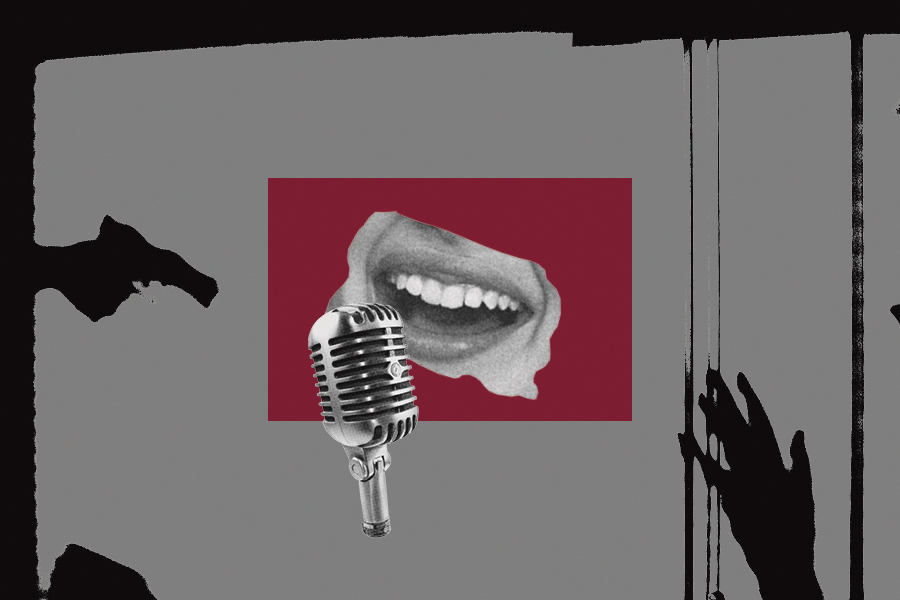In April 2020, I desperately needed something to curb the tedium of early quarantine. I settled on repainting my bedroom and took to the project with vigor, completing it over the course of a week. To fill the silence between brushstrokes, I turned to reliable long-form audio entertainment — true crime podcasts. For that week, it was just me, semi-gloss paint and a disembodied voice narrating the demise of countless innocent people.
Inhaling paint fumes and indulging in hours of violent media is not exactly a practice in mindfulness, but it did not strike me as an outright harmful use of my time either. Only in the following months — when my true crime enthusiasm waned — did I step back to thoroughly consider its cruel implications.
Upon questioning the premise of the genre, true crime answers for itself. By cutting down trauma to a palatable 45 minutes and interjecting it with inappropriately cheery ads, true crime podcasts make tourist attractions out of gravestones.
The brutality is endless.
Sensationalism obscures the nuance of a victim’s personhood and enshrines them in the infamy of their killer. This, along with nauseating listener responses such as serial killer fan clubs, invasive internet sleuths and a hypervigilance to personal safety that slips into paranoia, is evidence to the fact that true crime entertainment is a sinister cheap thrill.
In light of this realization, I was left feeling not only complicit in the exploitation of real-life tragedy, but also shaken by the extent to which I had been desensitized to it.
Case facts are filed away neatly in my memory and read with all the exuberance of a police report: Victim bled dry in the bathtub and dissolved with acid. Victim stabbed upward of 30 times. Victim found with organs missing. Victim identified with dental records due to physical disfigurement. Spiked through the cranium. Chopped, bagged, sunk.
The brutality is endless.
No doubt, the allure of true crime media stems from a seemingly infinite reserve of shock factor. Listeners satisfy their morbid curiosity by knowing that whatever episode they choose is certifiably horrific — and thus utterly fascinating.
This mechanism of instant gratification, all too familiar in the age of social media, has troubling repercussions. When it operates to convey highly graphic content, a recipient’s tolerance subconsciously builds up. Over time, emotional sensitivity plateaus.
The saturation of the true crime audiosphere does just this, with some popular shows pumping out weekly installments for years on end. Now, fans have a revolving door of horror at their disposal. Listen on your commute! Listen with friends! Listen before you go to bed! Let it play in the background and deaden your own empathy.
One fan, posting on a subreddit for their favorite show “Morbid,” lamented a steady decline in descriptive gore. “They use to tell us every gruesome detail of a story and that is what made it interesting, but now they’ll just skip over details because it’s ‘too much’ … They’ve really gotten too soft and have become way too commercial to be properly enjoyed.”
I implore true crime enthusiasts to see the cruelty in reducing humans to soundbites of their violent ends and to consider taking a break.
The commenter views censorship as an impediment to their listening experience rather than an effort to retain victims’ privacy and dignity. Their favorite podcast is part of an extractive entertainment industry predicated on effective raw material. The listener demands to be entertained; thus they feel entitled to the plunder of personal tragedy.
This is not to say that every true crime podcast is a soulless cash-grab turning us indifferent to suffering. Some podcast producers take care to cover cases ethically and pursue justice for the victims that were affected.
The show “Crime Junkie” has donated over $640,000 to different advocacy organizations and charities with help from its devoted listener base. On several occasions, they have directly supported families of victims whose stories they’ve covered. In 2021, one of the co-hosts, Ashley Flowers, founded Season of Justice, a nonprofit dedicated to funding investigative agencies in their efforts to solve cold cases.
I understand that some listeners may expect moral follow-through from their favorite true crime podcasts. The genre does raise some degree of awareness, which can lead listeners to dignify themselves as patrons of a noble cause. However, I hesitate to call the business altruistic. Despite the show’s philanthropy, “Crime Junkie” also advertises a paid fan club membership and the hosts have toured the country, performing a rehearsed episode for ticket holders.
The spectacle of violence is a longstanding tradition in the world of media entertainment. When it comes to reality — rather than fictionalized narratives — we cannot lose sight of the people who were impacted.
True crime podcasts capitalize on victims, shoving tragic source material into machinery that cuts it to size and coats it in shiny lacquer. The output is a formulaic portrait of the killer and the killed.
Notorious criminals are delineated and mythologized in full color, their names committed to our collective memory. The other party is rendered in caricature: a jumble of many stolen lives, ubiquitously referred to as “the victim.”
I implore true crime enthusiasts to see the cruelty in reducing humans to soundbites of their violent ends and to consider taking a break. Painting victims with such broad strokes is an unmistakable desecration in itself.



